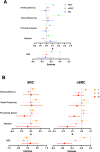Sports-related concussion not associated with long-term cognitive or behavioural deficits: the PROTECT-TBI study
- PMID: 39231581
- PMCID: PMC12015030
- DOI: 10.1136/jnnp-2024-334039
Sports-related concussion not associated with long-term cognitive or behavioural deficits: the PROTECT-TBI study
Abstract
Background: The cognitive effects of sports-related concussion (SRC) have been the subject of vigorous debate but there has been little research into long-term outcomes in non-athlete populations.
Methods: This cohort study of UK community-dwelling adults (aged 50-90 years) was conducted between November 2015 and November 2020, with up to 4 years annual follow-up (n=15 214). Lifetime history of concussions was collected at baseline using the Brain Injury Screening Questionnaire. The first analysis grouped participants by type of concussion (no concussion, only SRC, only non-SRC (nSRC), mixed concussions (both SRC and nSRC)) and the second grouped the participants by number (0, 1, 2 or 3+ SRC or nSRC). Mixed models were used to assess the effect of concussion on outcomes including four cognitive domains and one behavioural measure (Mild Behavioural Impairment-C).
Results: Analysis of the included participants (24% male, mean age=64) at baseline found that the SRC group had significantly better working memory (B=0.113, 95% CI 0.038, 0.188) and verbal reasoning (B=0.199, 95% CI 0.092, 0.306) compared with those without concussion. Those who had suffered one SRC had significantly better verbal reasoning (B=0.111, 95% CI 0.031, 0.19) and attention (B=0.115, 95% CI 0.028, 0.203) compared with those with no SRC at baseline. Those with 3+ nSRCs had significantly worse processing speed (B=-0.082, 95% CI -0.144 to -0.019) and attention (B=-0.156, 95% CI -0.248 to -0.063). Those with 3+ nSRCs had a significantly worse trajectory of verbal reasoning with increasing age (B=-0.088, 95% CI -0.149 to -0.026).
Conclusions: Compared with those reporting no previous concussions, those with SRC had no cognitive or behavioural deficits and seemed to perform better in some tasks. As indicated by previous studies, sports participation may confer long-term cognitive benefits.
Keywords: COGNITION; CONCUSSION; HEAD INJURY; HEALTH ECONOMICS; NEUROPSYCHIATRY.
© Author(s) (or their employer(s)) 2025. Re-use permitted under CC BY-NC. No commercial re-use. See rights and permissions. Published by BMJ Group.
Conflict of interest statement
Competing interests: CB collected consulting fees from the following companies: Acadia, AARP, Addex, Biohaven, Eli Lily and Company, Enterin Inc, Exciva, H.Lundbeck A.S, Janssen Pharmaceuticals, Novo Nordisk, Orion Corp., Otsuka America Pharm Inc, Sunovion Pharm Inc, Suven, Roche, Axosome and Biogen. CB is on Advisory Boards for the following companies: Acadia, Roche, Novo-Nordisk, AARP, Biogen and Synexus. CB received an Honorarium from Harvard University for speaking. AH is the owner and director of Future Cognition Ltd, a software development company the consulted on the development of the cognitive assessment software.
Figures

References
MeSH terms
LinkOut - more resources
Full Text Sources
Medical
Research Materials
Miscellaneous
